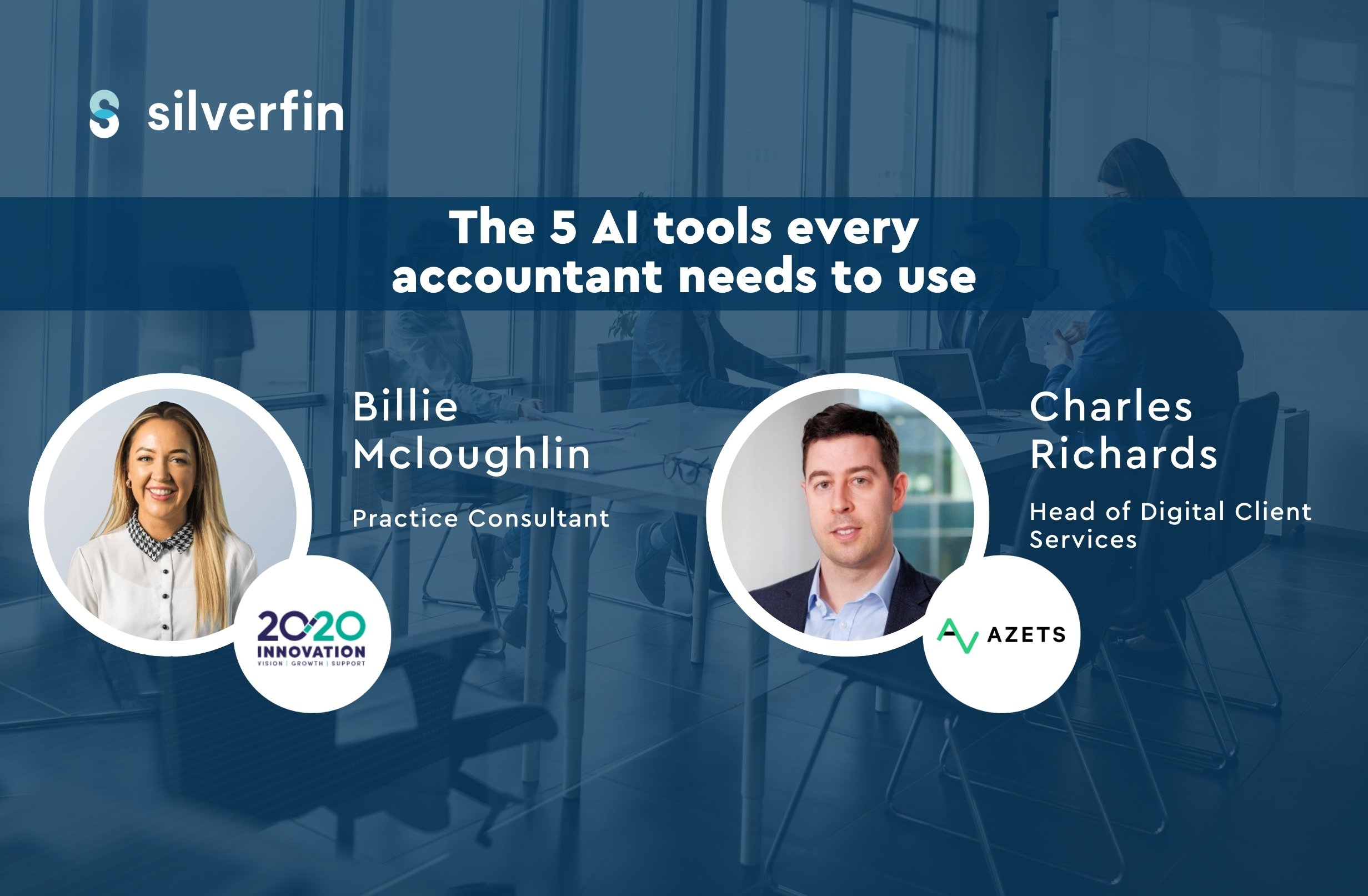I was delighted to present at the annual Digital Accounting Show on the Tech Academy stage with my colleague Ken Bastiaensen, Director of Special Projects & Innovation. Ken started an AI business in 2017, which Silverfin acquired a few years ago and from which much of our AI functionality available today in Silverfin Assistant stems. As Silverfin UK GM, who was originally an accountant, but shifted 15 years ago into finance roles for SaaS companies, we have a shared passion for setting a few AI records straight and encouraging the accounting sector to explore and ideally embrace all AI can offer.
Our talk covered three areas.
- A solid data foundation
- Where generative AI delivers the most value
- The accounting issues AI can tackle
But why bother with AI at all?
There are enough articles out there already that talk about AI replacing jobs (according to the IMF accountants are the third most at-risk profession) but we’re not here to scaremonger as we’re confident that the jobs it will take will be mostly low value, low satisfaction data checking roles while enhancing opportunities for advisory where advice opportunities based on better data will flourish.
However, there is a very present need for accounting firms to better understand AI because it’s fantastic and fantastical.
At Silverfin, we have been doing a lot of thinking about the current state of AI in the accounting space. We can see a lot of hype and this makes it even more important to get under the surface and assess the real benefits, not least to check we are doing the right things, but also to articulate for customers the current situation and future opportunities. This is neatly summarised in our recent whitepaper.
So, back to our first agenda point; solid data foundation.
Last week we used this image – your company and clients’ data are the jenga pieces and the key takeaway is that foundations matter and for the best AI results, live, connected standardised data unlocks the most value.
That’s what we started with at Silverfin: using AI to enrich your data and structure it, so – once it’s connected in the cloud and in real-time – this standardisation automates and optimises your workflow.
Then, our AI assistant can start automatically looking for outliers and opportunities, continuously in the background and only alert you with the right message in the right spot at the right time.
Ultimately, the aim is to;
With the generative AI wave that started a bit more than a year ago, we see that the value of data has actually diminished. Now, with only a few examples, generative AI is able to generalise much faster and mimic human reasoning, accelerating insights and efficiencies we can create. But, it still needs the complete system of monitoring the AI outputs and keeping the user in control as we have learned over the past years.
Moving on then to our second agenda point; Where generative AI delivers the most value.
Some of the largest implementations of newer technology in the AI space over the last year have used new generative technologies.
In general, we see greater value with these technologies being added in the space of communicating with customers. So, in the accounting industry, where firms have touch points with clients. For example, email generation has been a good use case for Gen-AI because, with little more than the standard Gen-AI offerings, it can provide advantages of professionalising language and making tone of voice more consistent across an organisation. Where there is a standard flow of activity, such as sorting out client agreements, renewals, information requests and other day-to-day repeatable elements it can be extremely valuable.
Here Gen-AI can cover the work quickly and, even if the efficiency benefits gained are comparable to the extra time taken to write the prompt, the output will align tone better and reduce human error. These are the types of inconsistencies which aren’t critical risks for firms, but can really help with overall brand and reputation.
We have also seen some really strong advancements with chat-bots for customer support. This has been more prevalent outside of the accounting industry where retail-type functions with high volumes of simple customer interactions are being completed by far more intelligent bots than we had seen in the past. We have not seen much use of this on accounting firms external websites, with the “contact us” form still being preferred to allow for a personal follow up as the first touch point with a potential new client. However, the potential to answer queries without talking to someone as a first step is certainly providing value in the wider technology space.
So, to our third and final agenda point, which accounting issues AI can tackle.
From our research, and delved into in more detail in our whitepaper, we identified these six areas where AI can impact an accounting firm’s position in the market.
As mentioned previously, the focus for generative AI has been primarily focused on areas of written language such as email, chat or business commentary. The rise and ubiquity of generative AI is great because it can be used in such broad ways. Email for example, is not industry specific and the demand, and therefore the opportunity, is very wide and includes the accounting industry.
Traditional machine learning has generally been more numbers focused. We use this type of AI within Silverfin to help accountants with things such as error recognition, trend analysis, flagging of technical risks or outliers and more. Our models are trained on numeric content and data structures that speak the language of numbers or codes.
But, the most interesting thing about these different uses is that they are complementary and both can provide value in different ways and, when combined and used together, can amplify the overall value delivered.
Thinking of the six areas listed there is an obvious logic, but I wanted to highlight a couple that I think are particularly important:
Firstly, on consistency, accuracy and quality – this is one that while important is more like a base expectation. It’s about ensuring that high-quality work is delivered.
One of the most common accounting issues we tackle in this space is in trend analysis. In a very simple example, a point might be raised to an accountant to review the situation with debtors on the basis that a debtor’s days calculation was performed which, when compared to training data, was identified as being extreme. In addition to the flag, the Silverfin Assistant provides further relevant information – in this example, the numeric result, method of calculation and the % of where the result lies with respect to expectation, to ensure the accountant has the context and to speed up the review process.
We also use AI within Silverfin to map accounts. This is one of the keys to enabling a wider technology stack and allowing accounting firms to be able to operate, for example, with customers that use different bookkeeping tools to capture transactions in the first place. Often this mapping activity can be tedious, especially when taking on clients that have generated custom accounts, ones that are not well described, or simply specific to an industry that may not be the specialty of a firm or a team member. And, circling back to some of the data points we discussed earlier, having connected live client files coupled with automatic connections and data which flows through in a very natural way helps users to get the real work done.
Silverfin has halved the budget for the majority of jobs. And I do expect that it will just get quicker and quicker, especially with tools like Silverfin Assistant.
Rosie Cooper, Director, PM+M
Another key benefit concerns talent attraction, retention and development.
There is a well documented issue concerning the imbalance caused by the increased demand for high-quality accounting services compared to a limitation of both new and experienced people coming from education or the existing market. One of the great promises that we see AI delivering is the ability to reduce this issue. In addition to the efficiencies that will obviously allow for more output per person, there is also the training aspect that AI can perform. If there are trends or outliers identified using AI this can draw the attention of more junior staff to the right areas and problems and then AI effectively acts as a trainer or senior assistant.
Generative AI could make Accountants’ dreams come true
One of the things that we have done with the design of Silverfin Assistant is to provide sources, explanations and formulas alongside the points themselves. This allows users to understand the context and the reasons why things are being flagged.
If, for example, a flag is raised around the existence of a directors loan for more than 9 months after the period end, it provides context around s.455 taxation and the areas of the legislation that apply. Furthermore, another step would be to review Retained Earnings to see if there was an ability to declare dividends in time to settle against the loan and therefore reduce or remove this tax exposure. If a user hadn’t come across this before, or if it wasn’t a regular part of someone’s client base, it can be a helpful reminder to be linked out to further information. If nothing else, it can raise a conversation for a junior to have with someone more experienced progressing their knowledge and understanding.
“AI should replace processes, not people. If you automate the processes that you spend ages doing manually, you’ll free up time to have more interactions with your clients and take up more of an advisory role.”
Russell Frayne, Director of Transformation, Gravita
To learn more about Silverfin Assistant, and how AI trained on data can help your firm find outliers, errors and opportunities in client files, start a free 14-day trial and explore Silverfin and its AI capabilities.
Already used by many leading firms, Silverfin Assistant continuously analyses client files and flags items with suggested fixes. It saves firms hours of manual checking while improving accuracy and client service.
Improving customer service and providing always-on training, Silverfin Assistant means you’re working with a trusted AI innovator that will keep your firm at the forefront of AI innovation. All our customers get access to technology innovations in a secure and risk-free manner. We invest heavily in R&D, so you don’t have to.















